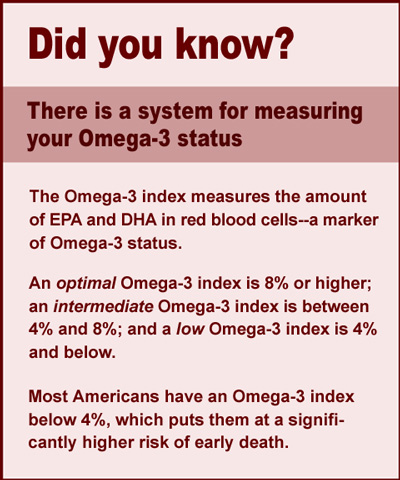Wikipedia asserts there is “no or litttle evidence” proving Omega-3 fatty acids confer any health benefit. “Evidence” to Wikipedia means multi-million dollar pharmaceutical-funded studies done in the same manner that are applied to new drugs with the potential to earn large profits.
That will never happen, of course, since there is no one to pay for studies of that magnitude on natural products.
Meanwhile, thousands of studies have been published highlighting the known health benefits of Omega-3s. Studies that Wikipedia chooses to ignore.
These studies run the gambit of lower level observational studies to extensive randomized double-blind placebo-controlled studies—the gold standard of studies.
Wikipedia also ignores the fact that in 2019, after the submission of over 700 studies, the US Food & Drug Administration finally allowed specific health claims relative to Omega-3s.
Here are three studies, conducted in just the past three months, that show the wide-ranging health benefits of Omega-3s:
Study 1
A meta-analysis submitted to Frontiers in Nutrition in July 2022 found that Omega-3s are positively associated with improved blood pressure. The research builds on dozens of earlier studies that found similar blood pressure benefits.
Researchers used PubMed, Web of Science and other databases to examine the impact of Omega-3s on blood pressure of 6,337 subjects aged 34 to 55 years. The average dosage across the studies was 2.2-6 grams per day with a duration of between four to 29 weeks. In total, researchers assessed 131 trials.
The researchers reported that Omega-3s were “both clinically and statistically significant” in reducing blood pressure, especially for study subjects over the age of 45. One of the blood pressure-supporting mechanisms the researchers attributed to Omega-3 supplementation was increased nitric oxide production.
“There is sufficient evidence for Omega-3 PUFAs to elicit helpful effects on blood pressure. Consequently, supplementation with Omega-3 PUFAs may be a useful adjuvant therapy in hypertensive patients,” the researchers wrote in the study summary.
Study 2
In the second study, published in Nutrients in August 2022, researchers found that six months of Omega-3 supplementation increased skeletal muscle strength in healthy older people.
The relatively-small study was conducted by scientists at the Mayo Clinic and Concordia University of Wisconsin and included 63 volunteers.
The daily supplement included 675 mg of Eicosapentaenoic acid (EPA) and 300 mg of Docosahexaenoic acid (DHA).
The data at the end of the study showed that the omega-3 group exhibited “modest but significant increases in muscle strength” of about 7.5%, compared to 3.1% in the placebo group.
“This increase appeared to be driven by improved muscle quality, as strength normalized to leg lean mass also increased in the Omega-3 PUFA group,” the researchers noted in the study conclusions.
Study 3
In the third study researchers found that dietary intervention with a combination Omega-3 supplement improved symptoms of patients with mild to moderate stage Alzheimer’s disease.
The research, a double-blind placebo-controlled study, was conducted in Ireland. The team included members of a research institute, a hospital and a medical school working in tandem. Results of the study were published in the Journal of Alzheimer’s Disease in September 2022.
The Omega-3 combination formula included 500 mg of DHA and 150 mg of EPA. The supplement also included small amounts of lutein, zeaxanthin and Vitamin E.
The test subjects were all under the supervision of a caregiver and the study period was 12 months.
The researchers found that a greater percentage of the treatment group improved their standard aptitude test scores. In addition, a smaller percentage of the treatment group declined over the course of the study as compared to the control group.
The most notable difference was seen in the area of memory. No one in the placebo group saw any improvement in their memory test score while 19% of the Omega-3 group had measured improvements.
“Importantly, improving these specific micronutrients suggest a positive impact on symptoms and patient outcomes, with better performance in objective measures of severity, as well as performing better from a clinical perspective in areas related to memory and mood,” the authors concluded.
All three Omega-3 essential fatty acids can be found in Optimal E.F.A. by Optimal Health Systems:
• A-linolenic acid (ALA)
• Eicosapentaenoic acid (EPA)
• Docosahexaenoic acid (DHA)
Click the banner ad on this page, or visit the product info page here.
– – –
Sources: Frontiers in Nutrition, Nutrients, Journal of Alzheimer’s Disease.



